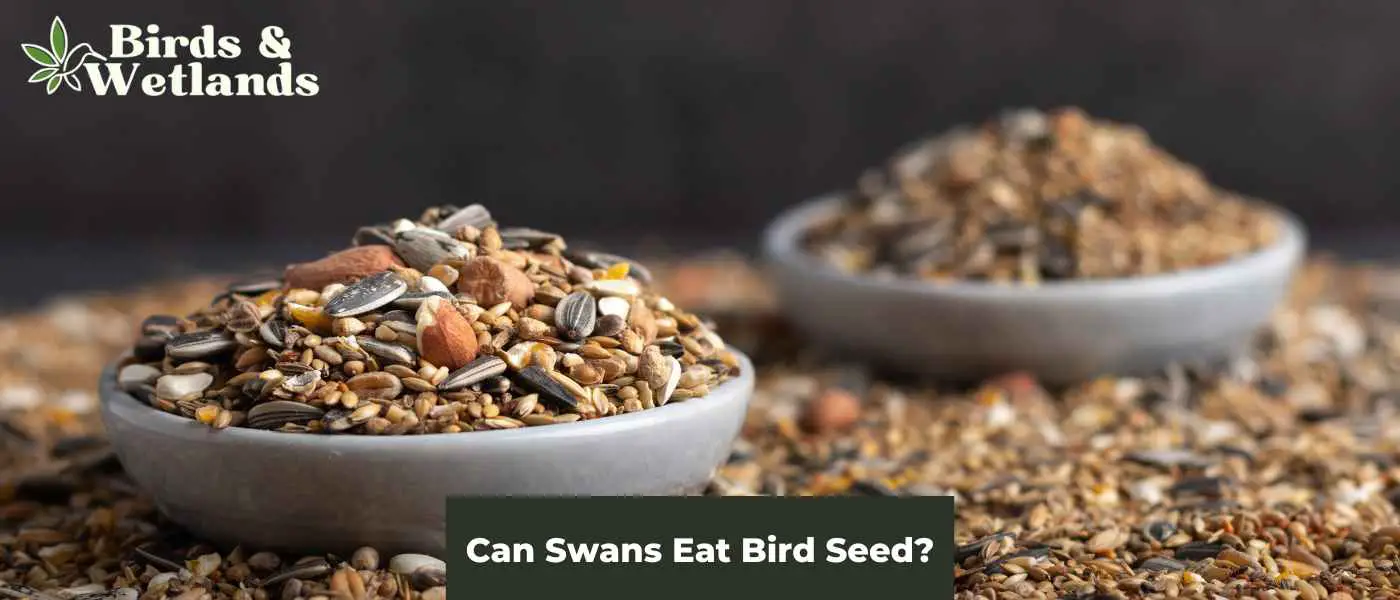Swans are beautiful creatures that are often found in ponds and lakes in USA, where people love to feed them. While their primary diet consists of aquatic vegetation, many people also offer them bird seed as a snack. But is bird seed a safe and healthy food option for swans?
Can Swans Eat Bird Seed?
Swans can eat bird seed as a supplemental food, as it can provide some nutrients they need. Bird seed typically consists of a mixture of seeds, grains, and sometimes dried fruits or insects, which can offer proteins, carbohydrates, fats, vitamins, and minerals. However, bird seed should not be the main source of nutrition for swans. When offering bird seed to swans, make sure it is clean and free of mold or pesticides.
Key Takeaways on Feeding Swans Birdseed
- Swans can eat bird seed as a supplemental food, providing some essential nutrients.
- Bird seed mixtures often contain seeds, grains, and sometimes dried fruits or insects, offering proteins, carbohydrates, fats, vitamins, and minerals.
- Bird seed should not be the main source of nutrition for swans; their diet should primarily consist of aquatic plants, seeds, and small aquatic animals.
- Ensure the bird seed is clean, free of mold or pesticides, and suitable for swans to consume.
- Focus on providing swans with a balanced and varied diet to support their overall health and well-being.
What is bird seed?
Bird seed is a mixture of seeds and other food items commonly fed to pet birds and wild birds. It typically contains a variety of seeds, such as sunflower seeds, millet, and safflower seeds, as well as other ingredients like nuts, dried fruits, and small pieces of bread or cereal.
The exact composition of birdseed can vary depending on the type of bird it is intended for and the preferences of the person buying it.
Bird seed is an easy and convenient food to feed wild birds, as it can be placed in a bird feeder or scattered on the ground. It’s also a popular food choice for pet bird owners, as it can be treated or mixed in with a bird’s regular diet.
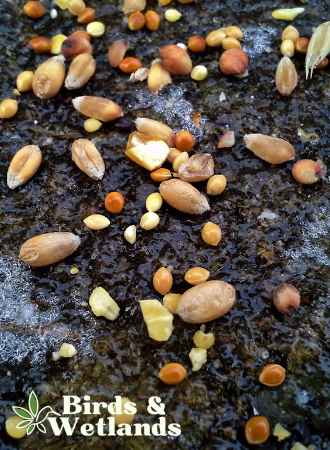
Are bird seeds good for swans?
Swans are large waterfowl often found near shallow water, wetlands, lakes, and rivers. They are known for their graceful movements and elegant appearance, but they also require a balanced diet to maintain their health.
Swans can find food on their own and they love foraging on potato fields, rivers, ponds and lakes. They use their long necks to reach aquatic plants and invertebrates under the water. They also eat short cropped grass and vegetable matter while supplementing their diet with animal matter. They eat about 25% of their body weight in food.
Feeding birdseed is one way to provide them with food that contains necessary nutrients. Birdseed contains a variety of seeds, including sunflower seeds, millet, and safflower seeds, which are rich in essential nutrients such as protein, carbohydrates, and healthy fats.
These seeds provide energy and promote the growth and maintenance of their body. Sunflower seeds, in particular, are high in vitamin E, an antioxidant that helps protect the swans from harmful free radicals and promotes a strong immune system.
Millet and safflower seeds are also good sources of B vitamins, which are important for growth, metabolism, and maintaining healthy skin and feathers.
In addition to seeds, birdseed may contain nuts, dried fruits, and small pieces of bread or cereal. These ingredients provide additional vitamins and minerals, such as calcium and phosphorus, essential for strong bones and healthy muscles.
Dried fruits, like raisins, also provide the swans with natural sugar, which can help to boost their energy levels.
Do swans like eating bird seed?
Swans are large waterfowl typically found in freshwater environments such as lakes, rivers, and marshes. In the wild, their diet primarily consists of aquatic plants, pondweeds and water lilies, and small aquatic animals, such as insects, crustaceans, and mollusks. Some swans, such as the Mute Swan, will also feed on small fish and amphibians.
While birdseed may not be a natural part of a swan’s diet, it is not uncommon for swans to consume it if it is readily available. However, it is important to note that there are better substitutes for a swan’s natural diet than birdseed, which should not be fed to them in large quantities.
Some mature swans love eating bird seed, not bread. But others might not get used to the taste. It may be an acquired taste for them.
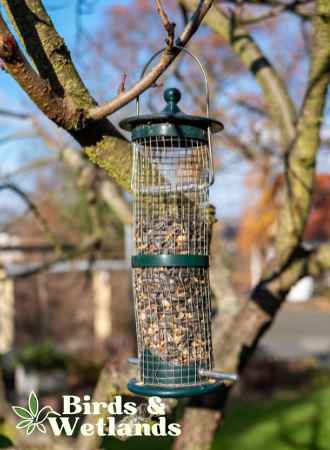
Can baby swans eat bird seed?
Baby swans may not eat birdseed as part of their diet, at least for the first four weeks from hatching. Birdseed is not a natural part of their diet, and their digestive system is still developing. Feeding them birdseed at this stage can lead to health problems.
One of the risks of feeding cygnets birdseed is that they may choke on the seeds or become lodged in their digestive tract. This can cause serious health problems and even death.
Instead, baby swans need a diet of foods high in protein, such as worms, small insects, and small fish. They also need a good amount of aquatic vegetation, plants and other natural food. These foods will provide the necessary nutrition for proper growth and development.
Does feeding swans bird seed result in the condition called angel wing?
It is unknown whether bird seed can cause angel wings in swans.
Angel wings, also known as “wing disease” or “drooped wing,” is a condition that affects waterfowl such as geese, swans and ducks. It is a condition in which the wings grow incorrectly or where the last joint of the wing (the “hand” or “metacarpal” joint) is twisted outwards, causing the feathers on the wing to stick out laterally.
Various factors, including improper nutrition, genetics, and viral or bacterial infections, can cause this deformity. It can also be caused by a lack of exercise, which can cause the muscles in the joint to become weak and not develop properly.
In some cases, birds affected with angel wings become the receiving end of bullying from other swans.
The condition can be treated with proper nutrition and exercise, but the affected birds may need to be euthanized in severe cases.
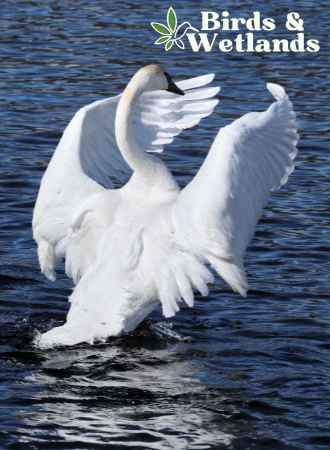
How often can swans feed on bird seed?
How often you can feed swans bird seed depends on the swans. If they like eating bird seed, you can feed it to them once or twice a week.
What other foods can you feed swans if they don’t like eating bird seed?
If the young and adult swans at your local park don’t like eating bird seed, don’t worry. There are plenty other foods you can give them.
- Duck food maybe a good option for swans even though they have different dietary needs than ducks. Waterfowl and duck feed pellets allows these majestic birds to feed naturally.
- Swans love lettuce, cabbage and other leafy greens. Other vegetables you can feed them include carrots and celery.
- Swans can also eat fruits such as blueberries, sliced deseeded apples and bananas.
- Grains such as cracked corn is another good food to feed swans.
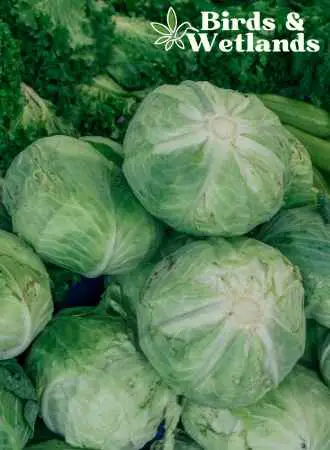
Related Questions on What to Feed Swans
Does bread cause angel wings?
Eating bread is often cited as a possible cause of angel wings in waterfowl. Bread is made from refined flour and sugar. It has a higher protein count than most foods and is high in carbohydrates and can disrupt the balance of nutrients in the birds’ diet.
Too much bread can lead to an imbalance of nutrients such as protein, calcium, and phosphorus, which can lead to disruption of normal nutrition, and bone and feather abnormalities. Some birds become weak and possibly infertile. If they can produce offspring, the young swans may be born unhealthy.
Additionally, bread can lead to obesity and crippling growth spurt, contributing to the development of angel wings. People should stop feeding bread to swans.
However, bread is far from the only cause of angel wings. Several factors, such as genetics, viral or bacterial infections, lack of exercise, and other environmental factors, can lead to this condition.
The only time bread can be beneficial for swans is during freezing weather or in the winter. Like most animals, swans need a reliable food source in the winter when food is usually scarce.
Other Foods for Swans
| Sunflower Seeds | Sunflower Seeds: A Healthy Swan Snack? |
| Oats | Can Swans Feast on Oats? |
| Lettuce | Can Swans Dine on Lettuce Leaves? |
| Bread | Should Swans Be Given Bread? |
Best Waterfowl Feed
Delightful Feeding Experience
Transform your backyard into a scenic waterfowl habitat and enjoy an interactive feeding experience with Natural Waterscapes Waterfowl Floating Food.

Pros
- Nutritious Food: Natural Waterscapes Waterfowl Floating Food is specifically designed to provide essential nutrients to waterfowl, including swans, geese, and ducks, helping them maintain a healthy diet.
- Convenient: The food comes in resealable packaging, making it easy to store and use as needed. It is also easy to handle and transport.
- Floating Formula: The floating formula of the food allows it to remain on the surface of the water, making it easier for waterfowl to eat and minimizing the risk of water contamination.
- Attracts Waterfowl: The food is formulated to attract various waterfowl species, including swans, geese, and ducks, to your pond, lake, or other water body, providing an opportunity to observe and enjoy these beautiful creatures.
- Environmentally Friendly: Natural Waterscapes Waterfowl Floating Food is made with environmentally friendly ingredients and does not contain any harmful preservatives, making it safe for both waterfowl and the environment.
Cons
- Shelf Life: The food’s shelf life may be limited compared to other types of waterfowl food due to its natural ingredients and lack of preservatives. This means you may need to use it up quickly after opening the package to prevent it from going bad.

